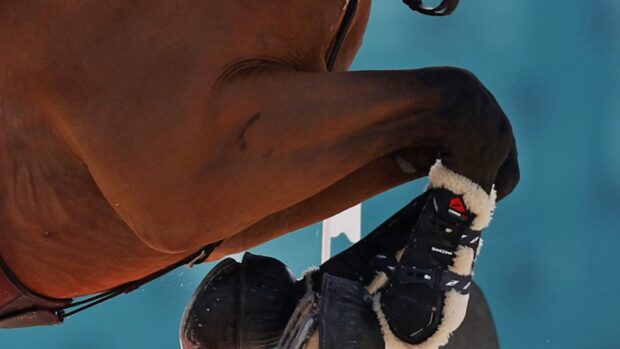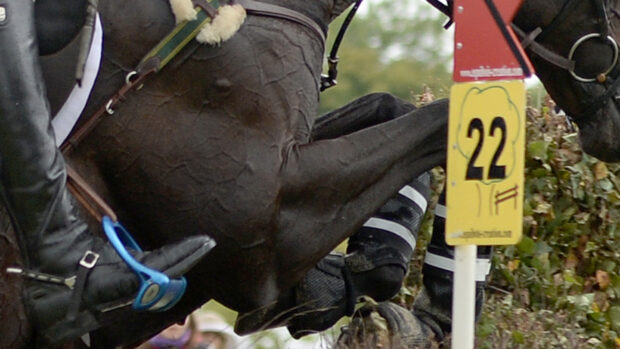The world’s top events will be renamed CCI5*-Ls from next season as the FEI rule changes for 2019 are approved.
All the disciplines face some changes to their rules for 2019, but eventing faces the most.
The flag, blood, and whip rules, as well as the new star system, have been among the much-debated areas of the sport this year and these all face changes for 2019.
Olympic teams in the equestrian disciplines will be made up of teams of three horse and rider combinations, as decided at the 2016 general assembly. However the FEI was still to finalise how substituting combinations would work in eventing.
Following trials at Strzegom and Millstreet in 2018, the FEI has now decided the penalties and criteria that will apply.
Major changes to the eventing rules are as follows:
The star system has been revised to include the new 1.05m level as the new “one-star”and to get rid of the CIC definition for international one-day events. This was approved at the 2017 general assembly, but the introduction of the new system was always planned to take place over two years so 2019 will be the first time the new star system is in force (see table below)
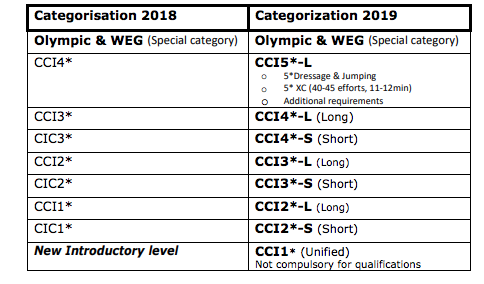
Flag rule: missing a flag when the majority of the horse’s body has passed through the flags will result in 15 penalties, instead of the current 50. This rule has also been reworded to define that if the body of the horse fails to pass between the extremities of the obstacle, that will be considered a run out (20 penalties) and continuing will result in elimination. Only official video recording can be used as evidence.
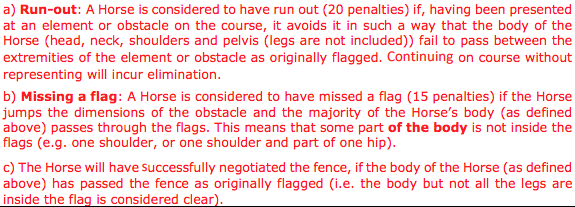
No unattached neck straps and no hackamores without a bit will be allowed for cross-country. The lever arm on any bit must not exceed 10cm.
Flying changes: at four-star championships and above, if the score for a flying change varies by three points or more from the average of the other judges’ scores for that movement, it can be corrected.
No more collectives in the dressage phase: these will be replaced with one“overall impression of athlete and horse”mark, which will carry a double coefficient.
Bits: wording and diagrams over permitted bits has changed (see p77 here)
Time faults: in the showjumping phase, competitors will now receive 0.4 of a penalty for every second over the optimum time
Frangible penalties: 11 penalties for activation of any frangible device. The ground jury can no longer remove these for an “unexpected activation” from a “light tap”.
CCI5* entries and prize money: there will be a graduated increase inminimum total prize funds— €125,000 for 2020 and 2021 and €150,000 by 2022. The decision over set minimum and maximum number of starters has been postponed.
Whips: ground jury’s scope for dealing with excessive use or abuse of the whip has been extended so it is “not limited to” example scenarios set out in the rule. However these scenarios have also been revised and extended for 2019. The whip is now not to be used more than twice per incident; multiple excessive uses between fences can be a cause for a review by the ground jury; if the horse’s skin is broken or has visible marks, the use of whip will always deemed to be excessive. These clauses are in addition to the five others already in place.
The FEI has also outlined a ranking system for recorded warnings and yellow cards, clarifying which abuse or blood on the horse situations should result in a recorded warning, which are punishable by a yellow card or stronger punishment, and what happens in cases of multiple recorded warnings either for blood or for the same offence.
Blood: eventing’s blood rules have had a major overhaul and are as follows:
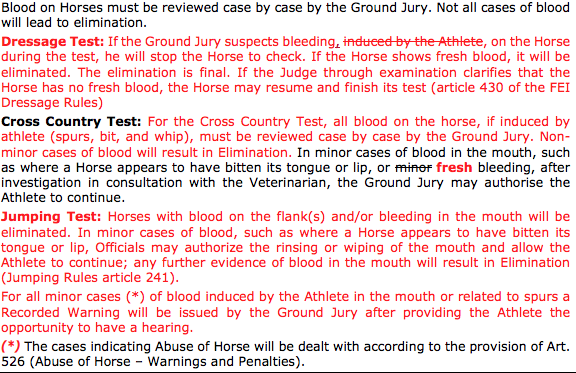
Olympic eventing 2020 rules
- Three to a team — travelling reserve can be substituted in part-way through the competition
- Combinations that do not complete the dressage or showjumping phase will be given a score of 100 penalties, and those who do not finish the cross-country will receive 200 penalties
- Substitutions on medical or veterinary grounds are allowed, but will be penalised with 20 penalties
- Only one substitution will be allowed per team and these are not allowed for disqualifications, or for eliminations for dangerous riding or abuse of the horse
- Penalty-free substitutions apply up at the first horse inspection and up to two hours prior to the start of the dressage
National federations voted on the changes at the 2018 general assembly in Bahrain (16 to 20 November 2019). Click here for the full 2019 rule book.
For more on the discussions and changes, don’t miss this week’s issue of Horse & Hound, out Thursday (29 November).



